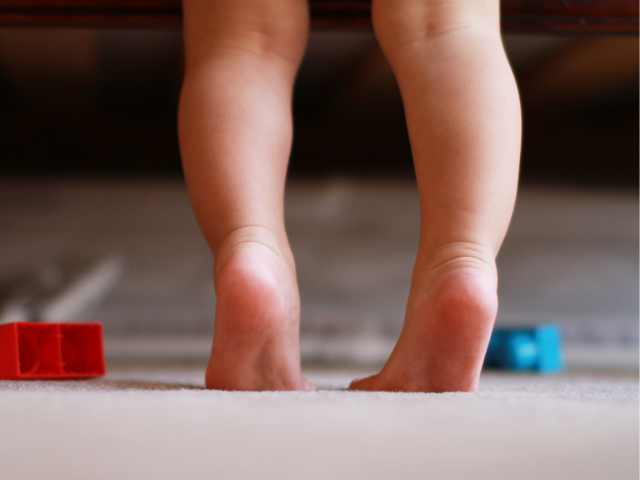What is Toe Walking?
Toe walking means that a child walks on his tiptoes or doesn’t contact the ground with his heel first when taking a step. This is considered “normal” until sometime between the ages of 2 and 3. Beyond that age, without any definitive medical reason (e.g., sensory issues), it is regarded as idiopathic toe walking or toe walking without a known cause – simply a habit the child has developed.
Toe Walking Causes
The definition of toe walking is simple, but what’s not so simple about habitual toe walking is WHY? There are many possible reasons children might develop a toe walking pattern, and the research does not definitively point to one specific cause.
Are they exhibiting tactile defensiveness in their feet? Is there a proprioceptive or vestibular problem? Or could toe walking be a warning sign of a neurological disorder like cerebral palsy or muscular dystrophy? Could it be a sign of autism? Is the child’s calf musculature so tight that he can’t put his heel down? Is this simply a habit that could eventually lead to tight calf musculature and the inability to put the heel down?
But not every child who walks on their toes has a serious diagnosis coming down the pike. I have seen several kiddos that outgrow the toe walking pattern. Some research indicates that children usually outgrow it by age 5.
Most often, if a child is showing no signs of developmental delay other than toe walking, he will outgrow this pattern and continue with typical development. As therapists, we are more concerned when toe walking is accompanied by additional sensory processing concerns or other developmental issues.
Treatment for Toe Walking
Many parents wonder how to stop toe-walking with their children. Therapeutic treatment for toe walking depends on the cause. It also depends on how strong of a habit it is. Ask yourself, do they ever contact the ground with their heels, or are they always on their toes? How tight the gastrocnemius muscles (calf muscles) have become. What other changes have occurred in the child’s foot and ankle muscles due to walking this way?
Treatment methods can include stretching, serial casting (a series of casts applied over time that gradually stretch the heel cords), or Botox injections (used to temporarily paralyze the calf muscle so that it is easier to try). Bracing can also be used to limit movement, preventing the child from getting up onto his toes (in milder cases, stiff boots or high-top tennis shoes can sometimes have the same effect). In rare and severe cases, surgical lengthening is also an option for treatment. Suppose the toe walking is caused by a sensory issue related to the child’s inability to tolerate the feeling of the ground on his feet. In that case, sensory interventions can be introduced and may include the Wilbarger brushing protocol, proprioceptive input via vibration, or deep pressure to the feet or shoulders.
Ultimately, the reasons behind toe walking are often challenging to determine. Even after 13 years of experience in pediatrics, I find this one of the most challenging child development issues to get to the bottom of and treat. There are many conflicting views about which treatments work and which ones don’t. I believe every child is different and will respond differently to any given treatment. What works for one may not work at all for another. Either way, toe walking is something to be aware of and monitor.
What Should You Do?
If your child is over the age of two and walks on his toes regularly, it wouldn’t hurt to consult your pediatrician. You may be told that they will outgrow it, which may be true…or maybe not. Do you have other sensory processing or developmental concerns? Are you noticing other motor concerns? Do you notice your child’s heel cords getting so tight that he can’t even stand on flat feet if he tries?
If you’re concerned, speak up at your next appointment with your pediatrician. Be an advocate for your child–you know him better than anyone! Get things taken care of before something small turns into something that will take more serious measures to correct.
Related Articles on Toe Walking
Toe Walking: Should you be concerned?
Understanding Sensory Processing Issues – FAQ



